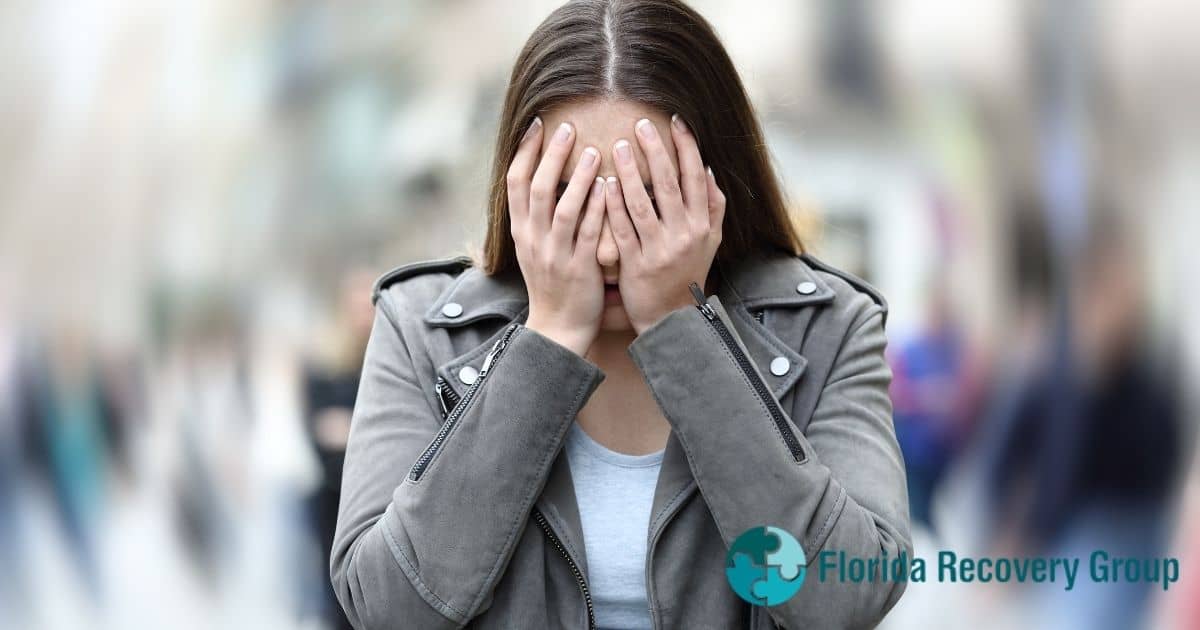
14 Jan Can Anxiety Be Treated Without Benzodiazepines?
Anxiety is a broad term that encompasses a range of mental health conditions. From generalized anxiety to social anxiety, many people suffer from an anxiety disorder in the United States. In fact, anxiety is the most common mental health condition other than depression.
According to The National Alliance on Mental Illness, more than 40 million adults in the U.S. (19.1% of the adult population) have an anxiety disorder.[1]
Anxiety disorders are often treated with a combination of medication and psychotherapy. Oftentimes, individuals are intimidated by their idea of anxiety medication, causing them to avoid utilizing medication altogether. This is because many people are only aware of benzodiazepine anxiety medications. Benzodiazepine anxiety medications are extremely habit-forming, making it understandable for individuals to be apprehensive.
At the same time, many people who struggle with anxiety also struggle with addiction, and they may need safer anxiety medications to cope with their symptoms effectively without sacrificing their sobriety. In addition to medication, therapy can also be used to treat anxiety.
Non-Addictive Medications for Anxiety
Benzodiazepine anxiety medications are effective in treating the symptoms of many anxiety disorders. However, taking these medications on a long-term basis can lead to additional issues such as dependency and addiction. Because of this, individuals who struggle with anxiety, especially those in recovery, should be aware of their options when it comes to non-addictive anxiety medications.
SSRIs
One of the most common types of anxiety medication is selective serotonin reuptake inhibitors (SSRIs). These medications work by increasing the amount of serotonin in the brain, which is known as the “feel-good” chemical. This helps to treat anxiety by improving moods and regulating emotions.
Common SSRIs for anxiety include:
- Sertraline (Zoloft)
- Citalopram (Celexa)
- Escitalopram (Lexapro)
- Fluoxetine (Prozac)
SNRIs
Serotonin and norepinephrine reuptake inhibitors (SNRIs) are similar to SSRIs, however, they increase the amount of both serotonin and norepinephrine in the brain. Serotonin produces feelings of happiness and regulates emotions, while norepinephrine improves concentration. This makes SNRIs extremely effective in treating panic disorders and generalized anxiety disorder.[2]
Common SNRIs for anxiety include:
- Venlafaxine (Effexor)
- Desvenlafaxine (Pristiq)
- Duloxetine (Cymbalta)
Buspirone
Buspirone (Buspar) is a non-narcotic anxiolytic medication that was created for the treatment of anxiety. This medication works similarly to SSRI medications, however, it reacts to fewer chemicals in the brain. It also produces fewer side effects. Buspirone is recommended for individuals with mild to moderate anxiety as a short-term treatment.
Hydroxyzine
Hydroxyzine is an antihistamine, which means it blocks the effects of histamines in an individual’s body. However, hydroxyzine is also a serotonin antagonist, meaning it boosts serotonin in the brain by preventing it from being reabsorbed into the brain’s neurons. This mechanism of action can reduce anxiety symptoms.
Beta-Blockers
Beta-blockers are medications used for short-term relief of anxiety. These medications are intended to be taken in the event of anxiety, as they do not change brain chemistry to prevent anxiety from occurring. In other words, beta-blockers are good for treating the effects of an anxiety attack.
Therapies Used to Treat Anxiety and Addiction
Therapy is one of the best ways to treat anxiety, especially for individuals in recovery from addiction. Anyone who takes anxiety medications should also be attending therapy. This is because while medication treats the symptoms of anxiety, therapy treats the causes.
The common therapies used to treat anxiety and addiction include:
- Cognitive Behavioral Therapy (CBT) – teaches patients to replace negative patterns of thought with positive ones through exercises and homework.
- Dialectical Behavior Therapy (DBT) – a type of CBT that teaches mindfulness, healthy coping mechanisms for stress, emotional regulation, and interpersonal relationship skills.
- Eye Movement Desensitization and Reprocessing (EMDR) – helps patients heal from stressors by processing past and current traumas while utilizing bilateral stimulation.
- Talk Therapy – provides patients with a space to discuss their stressors and traumas freely and without judgment while a therapist provides insight, support, and instruction on how to heal.
Lifestyle Changes for Anxiety Reduction
Lastly, individuals who are looking for relief from their anxiety (without the use of habit-forming medication) should consider making some lifestyle changes. While it may seem silly to say that exercising and eating right is the key to anxiety disorder treatment, evidence has shown symptom improvement with these techniques.[3]
Common lifestyle changes that help treat anxiety include:
- Sticking to a healthy sleep schedule
- Staying active
- Eating healthy food and focusing on nutrition
- Avoiding drug or alcohol use
- Practicing meditation and mindfulness
- Commit to regular relaxation time
- Stay connected with friends and family
Eating healthier, exercising more often, and sleeping better are all great ways to reduce anxiety in an individual’s daily life. While some people find lifestyle changes to be enough, it is recommended to utilize medication or therapy on top of these practices. By combining non-addictive anxiety medication, evidence-based therapy, and healthy lifestyle changes, beating the effects of an anxiety disorder is possible.
Find Treatment for Anxiety and Addiction in Delray Beach Today
Anxiety conditions can make it difficult to function in an individual’s daily life. Sometimes life gets overwhelming, especially if you are struggling with co-occurring disorders like anxiety and addiction. Thankfully, addiction treatment centers like Florida Recovery Group offer dual diagnosis treatment plans to address both conditions simultaneously.
From the minute you walk through our doors and for the rest of your recovery, our team will be by your side. Contact us today for more information on our comprehensive treatment programs.
References:





